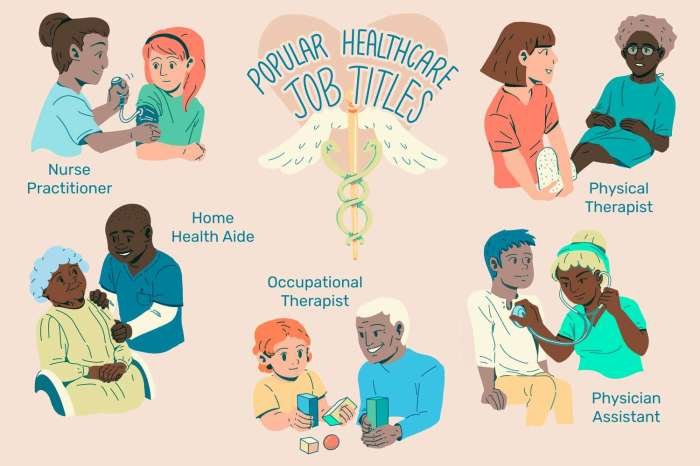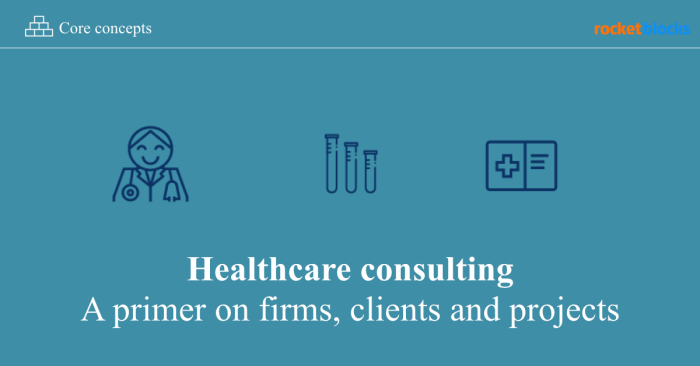Health care consulting job is a dynamic field that plays a pivotal role in shaping the future of healthcare. From improving patient care to optimizing operational efficiency, healthcare consultants work across diverse sectors, including hospitals, insurance companies, and pharmaceutical firms.
Their expertise is in high demand as healthcare systems navigate complex challenges such as rising costs, technological advancements, and evolving patient needs.
This guide provides a comprehensive overview of the healthcare consulting industry, exploring job roles, career paths, essential skills, and the hiring process. It also delves into the compensation and work-life balance associated with this rewarding profession.
The Healthcare Consulting Landscape: Health Care Consulting Job

The healthcare consulting industry is experiencing a period of rapid growth and transformation, driven by the confluence of technological advancements, evolving regulatory landscapes, and rising healthcare costs. This dynamic environment presents both opportunities and challenges for healthcare consultants, requiring them to possess a deep understanding of the industry’s intricacies and a forward-looking perspective on its future.
Key Trends and Challenges
The healthcare consulting landscape is characterized by several key trends and challenges that shape the industry’s trajectory. These include:
- Value-Based Care:The shift towards value-based care models, where providers are rewarded for delivering high-quality care at lower costs, is driving demand for consultants who can help healthcare organizations optimize their operations and improve patient outcomes.
- Technological Advancements:The rapid adoption of technologies such as artificial intelligence (AI), big data analytics, and telehealth is revolutionizing healthcare delivery, creating new opportunities for consultants with expertise in these areas.
- Regulatory Changes:The healthcare industry is subject to constant regulatory changes, such as the Affordable Care Act and the Medicare Access and CHIP Reauthorization Act (MACRA), which require consultants to stay abreast of evolving regulations and help clients navigate compliance requirements.
- Cybersecurity:The increasing reliance on technology in healthcare has heightened the risk of cyberattacks, making cybersecurity a critical concern for healthcare organizations. Consultants with cybersecurity expertise are in high demand to help organizations mitigate risks and protect sensitive patient data.
The Role of Technology in Transforming Healthcare Consulting
Technology is playing a transformative role in healthcare consulting, enabling consultants to deliver more efficient and effective services. Key technologies include:
- Data Analytics:Consultants are leveraging data analytics to identify trends, optimize processes, and improve patient care. For example, AI-powered analytics can help hospitals predict patient readmission rates and develop interventions to reduce them.
- Remote Consulting:Telehealth and virtual collaboration tools are enabling consultants to provide services remotely, expanding their reach and reducing travel costs.
- Automation:Automation tools are streamlining routine tasks, freeing up consultants to focus on higher-value activities, such as strategic planning and problem-solving.
Demand for Healthcare Consultants in Various Sectors
The demand for healthcare consultants is growing across various sectors, including:
- Hospitals and Health Systems:Hospitals and health systems are seeking consultants to help them improve operational efficiency, enhance patient care, and navigate the complexities of value-based care.
- Insurance Companies:Insurance companies are hiring consultants to advise them on risk management, pricing strategies, and the development of new products and services.
- Pharmaceutical Companies:Pharmaceutical companies are engaging consultants to help them with market research, pricing strategies, and the development of new drugs and therapies.
- Government Agencies:Government agencies are employing consultants to advise them on healthcare policy, program design, and implementation.
Job Roles and Responsibilities

Healthcare consulting encompasses a wide range of roles, each requiring specific expertise and responsibilities. This section delves into the common job roles in healthcare consulting, their associated responsibilities, and the key skills and qualifications needed for success.
Management Consulting
Management consultants in healthcare focus on improving the operational efficiency and effectiveness of healthcare organizations. They work with hospitals, clinics, insurance companies, and other healthcare providers to identify and implement solutions to complex challenges.Management consultants typically have a strong understanding of healthcare operations, financial management, and strategic planning.
They possess analytical skills, problem-solving abilities, and the ability to communicate complex ideas clearly and concisely.
- Conducting operational assessments: Management consultants evaluate the efficiency of healthcare organizations’ operations, including patient flow, staffing, and supply chain management. They analyze data, identify areas for improvement, and develop recommendations to optimize processes and reduce costs.
- Developing strategic plans: Consultants assist healthcare organizations in developing strategic plans that align with their goals and market trends. They help organizations define their vision, mission, and objectives, and create a roadmap for achieving them.
- Implementing change management programs: Management consultants help healthcare organizations implement changes that improve their performance. They work with stakeholders to develop a change management strategy, communicate the benefits of the change, and provide support during the implementation process.
- Developing and delivering training programs: Management consultants may develop and deliver training programs to healthcare professionals on topics such as process improvement, quality management, and leadership.
Strategy Consulting
Strategy consultants in healthcare help organizations develop and implement strategies to achieve their long-term goals. They provide insights into market trends, competitive landscape, and emerging technologies, enabling healthcare organizations to make informed decisions about their future.Strategy consultants possess strong analytical skills, strategic thinking abilities, and a deep understanding of the healthcare industry.
They are adept at conducting market research, analyzing data, and developing strategic recommendations.
- Conducting market research and analysis: Strategy consultants analyze market trends, competitive landscape, and emerging technologies to understand the opportunities and challenges facing healthcare organizations.
- Developing strategic roadmaps: Consultants help organizations develop strategic roadmaps that Artikel their long-term goals, objectives, and initiatives. They identify key growth areas, prioritize investments, and develop a plan for achieving desired outcomes.
- Facilitating strategic planning sessions: Strategy consultants facilitate workshops and meetings with senior management to develop and refine strategic plans. They leverage their expertise to guide discussions, synthesize ideas, and ensure alignment among stakeholders.
- Evaluating potential mergers and acquisitions: Consultants assist healthcare organizations in evaluating potential mergers and acquisitions by conducting due diligence, assessing financial performance, and identifying potential synergies.
Financial Consulting
Financial consultants in healthcare specialize in financial management, investment analysis, and regulatory compliance for healthcare organizations. They help organizations optimize their financial performance, manage risk, and ensure compliance with relevant regulations.Financial consultants possess strong financial modeling skills, analytical abilities, and a deep understanding of healthcare finance.
They are familiar with healthcare regulations, accounting standards, and investment strategies.
- Developing financial models: Financial consultants create financial models to forecast financial performance, evaluate investment opportunities, and assess the impact of different scenarios.
- Analyzing financial statements: Consultants analyze financial statements to identify trends, assess financial health, and identify areas for improvement. They use their expertise to provide insights into financial performance and recommend strategies for optimizing financial outcomes.
- Evaluating investment opportunities: Financial consultants evaluate investment opportunities for healthcare organizations, including mergers and acquisitions, capital expenditures, and new ventures. They conduct due diligence, assess financial risks and returns, and recommend investment strategies.
- Ensuring regulatory compliance: Financial consultants help healthcare organizations navigate complex regulatory requirements, such as Medicare and Medicaid reimbursement rules, HIPAA regulations, and tax laws. They ensure that organizations comply with relevant regulations and minimize financial risk.
Career Path and Progression

A career in healthcare consulting offers a dynamic and rewarding path with ample opportunities for growth and advancement. This section delves into the typical career trajectory, the significance of professional development, and the advantages and challenges of this profession.
Career Trajectory
A typical career path in healthcare consulting often begins with an entry-level position, such as an analyst or associate consultant. As consultants gain experience and demonstrate their skills, they progress through various levels, eventually reaching senior roles like principal or partner.
- Entry-level:Analysts and Associate Consultants typically perform research, data analysis, and support senior consultants on projects. They often work on specific tasks within larger projects and develop their consulting skills under the guidance of more experienced professionals.
- Mid-level:Consultants and Senior Consultants take on greater responsibility, leading project teams, managing client relationships, and delivering solutions. They often specialize in a particular area of healthcare consulting, such as strategy, operations, or technology.
- Senior-level:Principal Consultants and Partners are highly experienced and respected leaders in the field. They manage large, complex projects, develop new business opportunities, and mentor junior consultants. They often have deep expertise in specific healthcare sectors or functional areas.
Professional Development
Continuous professional development is crucial for success in healthcare consulting. Consultants must stay abreast of the latest industry trends, regulatory changes, and technological advancements. This can be achieved through various avenues, including:
- Formal education:Pursuing a master’s degree in healthcare administration (MHA), health policy, or a related field can provide a strong foundation for a consulting career.
- Certifications:Obtaining certifications, such as the Certified Healthcare Management Executive (CHME) or the Certified Healthcare Financial Professional (CHFP), can demonstrate specialized knowledge and enhance career prospects.
- Professional associations:Joining professional associations, such as the American Health Information Management Association (AHIMA) or the Healthcare Financial Management Association (HFMA), provides access to networking opportunities, industry insights, and educational resources.
- Continuing education:Attending conferences, workshops, and seminars on relevant topics helps consultants stay updated on the latest developments in the healthcare industry.
Benefits of a Career in Healthcare Consulting, Health care consulting job
A career in healthcare consulting offers several advantages:
- Intellectual stimulation:Consultants are constantly challenged to solve complex problems and develop innovative solutions for clients.
- Variety of projects:Consultants work on a wide range of projects, gaining exposure to different healthcare sectors, functional areas, and client organizations.
- Impactful work:Consultants contribute to improving the quality, efficiency, and effectiveness of healthcare delivery.
- Career advancement opportunities:The field offers a clear career path with opportunities for rapid growth and promotion.
- Competitive compensation:Healthcare consultants typically earn competitive salaries and benefits.
Challenges of a Career in Healthcare Consulting
While rewarding, a career in healthcare consulting also presents challenges:
- Long hours and travel:Consultants often work long hours, including weekends and evenings, and may travel frequently to client sites.
- High-pressure environment:The fast-paced nature of consulting can be demanding and stressful, with tight deadlines and high expectations.
- Constant learning:Consultants must constantly learn and adapt to new technologies, regulations, and industry trends.
- Competition:The consulting industry is highly competitive, with many talented professionals vying for the same opportunities.
Key Skills and Competencies

Healthcare consulting requires a unique blend of technical expertise and interpersonal skills. Successful consultants navigate complex healthcare systems, analyze data, and communicate effectively with diverse stakeholders.
A healthcare consulting job can be incredibly rewarding, offering the chance to make a real difference in people’s lives. While the focus is on health, it’s important to remember that wellness encompasses all aspects of life, including beauty. For example, many people find a sense of confidence and self-care through visiting a beauty store like Ulta.
Ultimately, a healthy lifestyle is about finding what works best for you, whether it’s a new skincare routine or a commitment to regular exercise.
Hard Skills
Hard skills are the technical abilities and knowledge that are essential for performing specific tasks. These skills are often acquired through formal education or training. In healthcare consulting, hard skills are crucial for analyzing data, developing solutions, and presenting findings to clients.
- Data Analysis: Healthcare consultants frequently analyze large datasets to identify trends, patterns, and insights. They use statistical software like SPSS, SAS, or R to conduct descriptive and inferential analysis, perform data visualization, and generate reports.
- Financial Modeling: Healthcare consultants use financial modeling to forecast costs, evaluate investment opportunities, and assess the financial impact of proposed changes. They leverage tools like Excel, Python, or specialized financial modeling software to build complex financial models that simulate different scenarios and inform decision-making.
- Project Management: Healthcare consulting projects often involve multiple stakeholders, complex timelines, and evolving requirements. Strong project management skills are essential for coordinating tasks, managing resources, and delivering projects on time and within budget.
- Healthcare Policy and Regulations: Healthcare consultants need a thorough understanding of healthcare policy, regulations, and reimbursement models. This knowledge allows them to advise clients on compliance, navigate regulatory landscapes, and develop strategies that align with industry standards.
- Healthcare Operations: Consultants should have a basic understanding of healthcare operations, including clinical workflows, patient care processes, and operational efficiency. This knowledge enables them to identify areas for improvement and recommend solutions that enhance patient care and reduce costs.
Soft Skills
Soft skills are the interpersonal and communication skills that enable effective collaboration, communication, and problem-solving. They are equally important as hard skills in healthcare consulting, as they foster trust, build relationships, and ensure successful project delivery.
- Communication: Healthcare consultants must effectively communicate complex information to diverse audiences, including clients, stakeholders, and healthcare professionals. They need strong written and verbal communication skills, including the ability to present findings clearly, concisely, and persuasively.
- Teamwork: Healthcare consulting projects often involve collaboration with colleagues, clients, and other stakeholders. Strong teamwork skills are essential for working effectively in a team environment, sharing information, and coordinating efforts to achieve common goals.
- Problem-Solving: Healthcare consultants are often tasked with identifying and solving complex problems in the healthcare industry. They need strong analytical and critical thinking skills to define problems, gather data, develop solutions, and implement recommendations.
- Critical Thinking: Healthcare consultants need to be able to analyze information objectively, evaluate different perspectives, and make informed decisions based on evidence. Critical thinking skills are essential for identifying assumptions, evaluating arguments, and developing solutions that are grounded in data and logic.
- Adaptability: The healthcare industry is constantly evolving, and healthcare consultants must be able to adapt to changing circumstances, learn new skills, and embrace new technologies. Adaptability is crucial for navigating the dynamic nature of the healthcare landscape and delivering value to clients.
Applying Skills in Real-World Projects
Healthcare consultants use their hard and soft skills to address real-world challenges in the healthcare industry. For example, a consultant might be tasked with helping a hospital improve its operational efficiency.
- Data Analysis: The consultant would use data analysis techniques to identify areas where the hospital is inefficient, such as long wait times in the emergency room or high readmission rates. They would use statistical software to analyze data from patient records, operational metrics, and financial reports.
- Financial Modeling: The consultant would use financial modeling to evaluate the cost-effectiveness of different improvement strategies, such as implementing new technology or streamlining workflows. They would create financial models to project the impact of these changes on the hospital’s budget and profitability.
- Project Management: The consultant would use project management skills to coordinate the implementation of the improvement strategies, working with hospital staff, vendors, and other stakeholders. They would set deadlines, allocate resources, and monitor progress to ensure that the project stays on track.
A healthcare consulting job can be a challenging but rewarding career path, requiring analytical skills and a deep understanding of the industry. Just like the cast of American Beauty, cast of american beauty , each individual brings their unique talents and perspectives to the table, creating a dynamic and diverse team.
Similarly, in a healthcare consulting job, you’ll work with a team of experts, tackling complex problems and driving positive change within the healthcare system.
- Communication: The consultant would communicate their findings and recommendations to the hospital’s leadership team, explaining the rationale behind the proposed changes and addressing any concerns. They would use clear and concise language, visuals, and data to support their recommendations.
- Teamwork: The consultant would work closely with hospital staff to identify and implement the improvement strategies. They would foster collaboration, build relationships, and ensure that everyone is working towards the same goals.
Educational Background and Certifications

A strong educational foundation is crucial for success in healthcare consulting. While specific requirements may vary depending on the consulting firm and specialization, a combination of business acumen and healthcare expertise is highly sought after.The educational background of healthcare consultants typically includes a blend of business and healthcare-related degrees.
Types of Degrees
A master’s degree is often considered the minimum educational requirement for entry-level positions. Common degree options include:
- Master of Business Administration (MBA):Provides a comprehensive understanding of business principles, financial analysis, strategy, and leadership, equipping consultants with the tools to analyze healthcare organizations and develop effective solutions.
- Master of Public Health (MPH):Focuses on public health issues, epidemiology, health policy, and program evaluation, providing a deep understanding of the healthcare system and its challenges.
- Master of Healthcare Administration (MHA):Specializes in healthcare management, covering topics like hospital operations, financial management, and quality improvement, preparing consultants to address operational challenges within healthcare organizations.
- Master of Science in Health Informatics (MSHI):Emphasizes data analysis, technology, and information systems in healthcare, equipping consultants to leverage data for improved decision-making and patient care.
Value of Certifications
Certifications demonstrate specialized knowledge and skills, enhancing credibility and competitive advantage.
- Lean Six Sigma:A process improvement methodology that focuses on eliminating waste and improving efficiency. This certification is valuable for consultants involved in operational improvement projects within healthcare organizations.
- Project Management Professional (PMP):A globally recognized certification that validates project management expertise, essential for consultants leading complex healthcare projects.
- Certified Healthcare Financial Professional (CHFP):Demonstrates expertise in healthcare finance, including budgeting, cost accounting, and reimbursement, particularly valuable for consultants specializing in financial advisory services.
Impact on Career Prospects
These credentials enhance career prospects in several ways:
- Increased Credibility:Certifications validate expertise and demonstrate commitment to professional development, enhancing credibility with clients and employers.
- Competitive Advantage:In a competitive field, certifications can differentiate candidates and make them stand out from the crowd, increasing job opportunities.
- Higher Earning Potential:Certified professionals often command higher salaries and faster career progression due to their specialized knowledge and skills.
The Hiring Process

Navigating the healthcare consulting hiring process can be a complex journey, requiring a strategic approach to stand out among the competition. It involves understanding the typical steps, preparing thoroughly for each stage, and showcasing your skills and experiences effectively.
Application Requirements
The initial step in the hiring process is submitting a compelling application. This typically involves an online application form, a resume, and a cover letter.
- Resume: A well-structured resume is crucial, highlighting your relevant experiences, skills, and achievements in a clear and concise manner. It should be tailored to the specific job requirements and demonstrate your suitability for the role.
- Cover Letter: A personalized cover letter is your opportunity to showcase your enthusiasm for the position and the firm.
It should articulate your understanding of the company’s values, your career aspirations, and how your skills and experiences align with the role’s demands.
- Online Application Form: Completing the online application form accurately and thoroughly is essential. Pay close attention to the details, ensuring consistency with your resume and cover letter.
Interview Stages
The interview process for healthcare consulting positions is typically multi-layered, involving several rounds designed to assess your suitability for the role.
- Initial Screening Interview: This is usually a brief phone or video call to discuss your background, experience, and interest in the position. It’s a chance to make a good first impression and demonstrate your enthusiasm.
- Case Interview: A core component of the healthcare consulting interview process, case interviews assess your analytical and problem-solving skills.
You’ll be presented with a business scenario and asked to analyze the situation, identify key issues, develop recommendations, and present your findings.
- Behavioral Interview: Behavioral interviews focus on your past experiences and how you’ve handled specific situations. They assess your leadership, teamwork, communication, and problem-solving abilities.
Be prepared to share examples of situations that demonstrate your skills and competencies.
- Partner Interview: This final round typically involves meeting with senior partners or managers to discuss your fit with the firm’s culture and values. It’s a chance to demonstrate your passion for healthcare and your commitment to the consulting profession.
Tips and Strategies for Successful Application and Interview Preparation
Thorough preparation is essential for success in the healthcare consulting hiring process.
- Research the Firm: Take the time to understand the firm’s culture, values, and areas of expertise. Demonstrate your knowledge and enthusiasm for the company during interviews.
- Practice Case Interviews: Case interviews are a critical component of the hiring process. Practice solving cases with friends, colleagues, or through online resources to develop your analytical and problem-solving skills.
- Prepare for Behavioral Interview Questions: Anticipate common behavioral interview questions and prepare concise and compelling stories that demonstrate your skills and experiences. Use the STAR method (Situation, Task, Action, Result) to structure your responses.
- Network with Professionals: Attend industry events, connect with healthcare consultants on LinkedIn, and reach out to professionals in your network for advice and insights.
Building relationships can open doors to opportunities and provide valuable guidance.
- Follow Up After Interviews: After each interview, send a thank-you note expressing your appreciation for the opportunity. This shows your professionalism and reinforces your interest in the position.
The Importance of Networking and Building Relationships
Networking plays a vital role in the healthcare consulting industry. It can provide valuable insights, open doors to opportunities, and help you build a strong professional network.
- Attend Industry Events: Industry conferences, workshops, and networking events offer opportunities to connect with professionals, learn about current trends, and explore potential job opportunities.
- Join Professional Organizations: Membership in healthcare consulting organizations provides access to resources, networking events, and career development opportunities.
A health care consulting job can be incredibly rewarding, especially when you’re helping organizations like Texas Health Harris Methodist Fort Worth improve their patient care and operational efficiency. These large healthcare systems often need expert guidance to navigate complex challenges, and consultants can provide valuable insights and solutions to optimize their services and achieve their goals.
- Engage on LinkedIn: Utilize LinkedIn to connect with healthcare consultants, follow industry leaders, and stay informed about industry trends.
- Reach Out to Professionals: Don’t be afraid to reach out to professionals in your network for advice, guidance, and insights.
Salary and Compensation

Healthcare consulting is a lucrative career path, offering competitive salaries and benefits. The compensation for healthcare consultants varies based on factors such as experience level, location, industry, and specific role.
Salary Ranges by Experience Level
The salary range for healthcare consultants can vary significantly based on experience. Here’s a general overview of salary ranges for different experience levels:
- Entry-Level Consultants:Entry-level consultants typically have 0-2 years of experience and earn an average salary of $60,000 to $85,000 per year.
- Mid-Level Consultants:Mid-level consultants have 3-5 years of experience and earn an average salary of $85,000 to $120,000 per year.
- Senior Consultants:Senior consultants have 6-10 years of experience and earn an average salary of $120,000 to $170,000 per year.
- Managing Consultants:Managing consultants have 10+ years of experience and earn an average salary of $170,000 to $250,000 per year.
- Partner/Principal:Partners or Principals in healthcare consulting firms typically have 15+ years of experience and earn an average salary of $250,000 to $500,000 per year.
Factors Influencing Compensation
Several factors can influence the compensation of healthcare consultants, including:
- Location:Consultants working in major metropolitan areas like New York City, Boston, and San Francisco tend to earn higher salaries compared to those in smaller cities or rural areas.
- Industry:Consultants specializing in high-demand areas like pharmaceuticals, healthcare technology, and medical devices often command higher salaries than those in other industries.
- Specific Role:Consultants with specialized skills, such as data analytics, financial modeling, or regulatory expertise, may earn higher salaries than generalists.
- Company Size and Reputation:Larger, more prestigious consulting firms often offer higher salaries and benefits packages.
- Performance and Achievements:Consultants who consistently deliver high-quality work and exceed expectations are often rewarded with higher compensation and bonuses.
Benefits and Perks
In addition to competitive salaries, healthcare consulting firms often offer a wide range of benefits and perks to attract and retain top talent. These benefits can include:
- Health Insurance:Comprehensive health insurance plans, including medical, dental, and vision coverage.
- Retirement Savings:401(k) plans with employer matching contributions.
- Paid Time Off:Generous vacation, sick leave, and holiday benefits.
- Professional Development:Opportunities for training, mentorship, and career advancement.
- Travel and Expenses:Reimbursement for travel expenses and per diem allowances for consultants working on client projects.
- Bonuses and Incentives:Performance-based bonuses and incentives for exceeding client expectations.
Work-Life Balance and Culture

Healthcare consulting, while intellectually stimulating and financially rewarding, is known for its demanding work environment. It’s crucial to understand the typical work-life balance and the culture of leading healthcare consulting firms before embarking on a career in this field.
Work-Life Balance
The work-life balance in healthcare consulting can be challenging, particularly during project deadlines. Consultants often work long hours, including evenings and weekends, to meet client demands. Travel is another significant factor, with consultants frequently traveling to client sites, which can disrupt personal schedules and family life.
Culture and Values of Leading Firms
Leading healthcare consulting firms generally prioritize a culture of excellence, collaboration, and client focus. They often emphasize the following values:
- Client-centricity:Consulting firms strive to deliver exceptional value to their clients by providing strategic insights and solutions.
- Teamwork and collaboration:Consultants work in teams, sharing knowledge and expertise to achieve common goals.
- Innovation and creativity:Firms encourage their consultants to think outside the box and develop innovative solutions to complex healthcare challenges.
- Professional development:Leading firms invest in their employees’ growth and development, offering opportunities for training, mentoring, and career advancement.
Pros and Cons of Working in Healthcare Consulting
Working in healthcare consulting offers a unique blend of intellectual stimulation, career growth, and impact. However, it’s essential to consider both the advantages and disadvantages before making a decision.
Pros
- Intellectual stimulation:Consultants tackle complex healthcare challenges and work on projects that have a real-world impact.
- Career growth:The industry offers rapid career progression with opportunities for specialization and leadership roles.
- Financial rewards:Consultants typically earn competitive salaries and bonuses.
- Networking opportunities:The industry provides access to a vast network of healthcare professionals and leaders.
Cons
- Demanding work schedule:Consultants often work long hours and may be required to travel frequently.
- High-pressure environment:The industry can be demanding, with tight deadlines and high expectations.
- Limited work-life balance:The demanding nature of the work can make it difficult to maintain a healthy work-life balance.
Case Studies and Examples

Healthcare consulting projects often involve tackling complex challenges and delivering impactful solutions. Real-world case studies provide valuable insights into the diverse range of projects undertaken by healthcare consultants. These case studies showcase the practical application of consulting skills and methodologies in addressing real-world healthcare issues.
Real-World Examples of Healthcare Consulting Projects
This section presents real-world examples of healthcare consulting projects, highlighting the project scope, client, challenges, and solutions.
| Project | Client | Scope | Challenges | Solutions | Impact |
|---|---|---|---|---|---|
| Improving Patient Flow in a Large Hospital | [Name of Hospital] | Optimize patient flow processes to reduce wait times and improve patient satisfaction. | Long wait times, inefficient scheduling, and inadequate resource allocation. | Implemented a new scheduling system, optimized patient flow processes, and improved resource allocation. | Reduced patient wait times by 20%, increased patient satisfaction, and improved operational efficiency. |
| Developing a Cost-Effective Cancer Treatment Program | [Name of Cancer Center] | Design a cost-effective cancer treatment program that improves patient outcomes and reduces costs. | High treatment costs, limited access to specialized treatments, and challenges in managing patient care. | Developed a comprehensive cancer treatment program that integrated evidence-based practices, optimized resource utilization, and improved patient outcomes. | Reduced treatment costs by 15%, improved patient outcomes, and increased access to specialized treatments. |
| Implementing a New Electronic Health Record System | [Name of Healthcare Provider] | Implement a new electronic health record system to enhance patient care and improve operational efficiency. | Challenges in data migration, system integration, and user training. | Developed a comprehensive implementation plan, addressed data migration issues, and provided extensive user training. | Improved patient care coordination, enhanced data accessibility, and increased operational efficiency. |
Last Recap

The healthcare consulting field offers a unique blend of analytical skills, business acumen, and a deep understanding of the healthcare landscape. It presents a challenging yet fulfilling career path for individuals passionate about improving healthcare outcomes and making a tangible impact on the lives of patients.
Whether you are considering a career transition or seeking to advance your existing expertise, the healthcare consulting industry presents a wealth of opportunities for growth and development.
Quick FAQs
What are the typical starting salaries for healthcare consultants?
Starting salaries for healthcare consultants vary depending on factors such as location, experience, and specific role. Entry-level positions typically offer salaries in the range of $60,000 to $80,000 per year. Experienced consultants can earn significantly higher salaries, often exceeding $100,000.
What are some common career paths for healthcare consultants?
Healthcare consultants can progress through various career paths. Some specialize in specific areas like strategy, finance, or operations, while others may move into leadership roles within consulting firms. Experienced consultants may also transition into senior management positions within healthcare organizations.
What are the benefits of working as a healthcare consultant?
Healthcare consulting offers numerous benefits, including exposure to diverse projects, rapid career advancement opportunities, and the chance to make a real difference in the healthcare industry. Consultants also often enjoy competitive salaries, comprehensive benefits packages, and the flexibility to work in different locations.